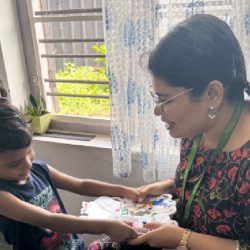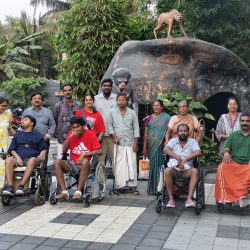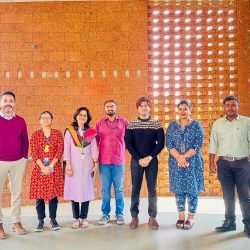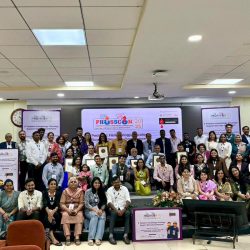August 2011
Heartening Action by Government of India

Our July newsletter had started with a call to action regarding Non-Communicable Diseases (NCDs). We had attached Pallium India’s letter to the Ministry of Health and requested you all to write to your respective Governments with similar “asks”.
In preparation for next month’s UN Summit on NCDs, the Indian Government’s Ministry of Health & Family Welfare and WHO India organized a 2-day National Summit on Noncommunicable Diseases, August 23-24, in New Delhi (press release). More than 200 delegates from various fields related to NCDs attended the meeting (programme).
During the inaugural function Mr RK Srivastava, Director General of Health Services, mentioned palliative care as one of the target areas of his department.
Minister for Health & Family Welfare, Mr Ghulam Nabi Azad, announced his ministry’s plans to launch home visit program for bed-bound patients in 100 districts in the country.
Our collective action is bearing fruit!
–
Good News About Our Efforts at the UN NCD Summit
Thank you for the support!
… were able to put 7 references to palliative care in the document. Now let us see how the EU and other developed countries view our position and what actually gets into the final document.
Those who have not written about it yet, please do it now!
Attached please find the letters – please feel free to download and use the attachments.
- Letter to Ambassdor HS Puri (.pdf)
- Final letter for PC Colleagues (.docx)
–
Health is Wealth?
“The poor man’s lack of health is industry’s wealth!”
Mr Suresh thaliyaril, a palliative care volunteer and organizer from D.Nip Care in Delhi wrote to Pallium India to ask,
A patient is getting Letrozole 2.5, the cost of 30 tablets:
- “Letroz 2.5” from Sun Pharmaceuticals, more than Rs.800
- “Letrozole 2.5” from Cipla: around Rs. 150
Is there any difference in the quality of these tablets? Which is better?
The patient needs the tablets on a long term basis. Kindly advise.

We unhesitatingly advised Mr Suresh Thaliyaril to go for the cheaper brand, which too is from a reputed company. A difference of more than 500%!
Our search for a possible reason for this disparity did not lead us to an answer, but took us to some other interesting news reports:
- “Illegal promotion of Letrozole in India” – from 2003 alleging that the drug which was approved only for cancer was being illegally marketed for promoting fertility among Indian women (letter written by the editor of MIMS India)
- “Sun Pharma’s letrozole under DTAB lens” – A report from DNA (Daily News & Analysis) which says that the then Drugs Controller General of India in 2007 authorised sale of Letrozole by Sun Pharmaceuticals for infertility and that Central Government’s Drugs Technical Advisory Board (which is investigating drugs which are banned globally but permitted for sale in India) will go into this too.
- A price list from Medline India which shows that there is yet another brand, Femara, which costs Rs. 5,445 for 30 tablets – 36 times more than Cipla!
Mr Suresh Thaliyaril, we salute your humanity which made you go into the cost of the drug and its impact on the patient and family. You have a lesson to teach the medical fraternity!
LIFE Before Death Series continues…
The “Life Before Death” series of short movies continue to be released one every week. They are not only very informative to the public; but also make powerful advocacy material for the palliative care community.
Thank you, Mike Hill and team of Moonshine Movies and thank you, Lien foundation,International Association for the Study of Pain, The Mayday Fund, the Union for International Cancer Control and The Institute for Palliative Medicine at San Diego Hospice International Programs.
For more information and to view the entire series, visit the Life Before Death website…
–
The Brain Drain
Writing in The Australian newspaper, Linda Kristjanson, Vice Chancellor of Australia’s New Swinburne University, Professor of Palliative Care Nursing and researcher, quotes from US President Barack Obama’s State of the Union address to the US Congress:
“Why do we train international students in our education system to advanced degree level, and then send them home to compete against us?
We should encourage them to stay in the US [..] to run research labs and build new businesses”
Read the full opinion piece: “Why overseas postgrads should be encouraged to stay”
That raises an important question that we in India should ask ourselves:
Why do we in India – at an enormous expense that should have gone in to welfare of our own suffering people – train doctors, nurses, engineers and other professionals so that Western countries are given a work force? Ultimately, at our poor country’s cost.
At least for those who are willing to return to our country and serve our people, does our system encourage them by providing opportunities? Or do we discourage them with our red tape and unfriendly bureaucracy?
–
Another Freedom Struggle!
Weep for the anguish of cigarette manufacturers who are being deprived of their freedom to kill others with their product.
The tobacco industry is spreading its wings and reaching out to more young lives that they want to destroy. But, this time the US Government is standing in their way by requiring “larger, more prominent cigarette health warnings on all cigarette packaging and advertisements”.
The warnings must be printed on the entire top half of the packaging, on back and front sides. Tobacco firms argue the plan violates their constitutional right to free speech and are now suing the US Food and Drug Administration over mandatory graphic warnings.
Related news reports:
- BBC: US cigarette makers sue over graphic warning labels
- LA Times: Tobacco companies sue FDA over graphic warnings
& Cigarette label rules: Legitimate warning or ‘compelled speech’? - FDA Press release (with warning label images)
We recently mentioned that Philip Morris is suing the Uruguayan Government over similar requirements.
–
Important Step Forward in Andhra Pradesh
 In 2006, the International Network for Cancer Treatment and Research (INCTR), American Cancer Society, Pallium India and MNJ Institute of Oncology (MNJIO) in Hyderabad joined hands to create a Palliative Care Training Institute at MNJIO.
In 2006, the International Network for Cancer Treatment and Research (INCTR), American Cancer Society, Pallium India and MNJ Institute of Oncology (MNJIO) in Hyderabad joined hands to create a Palliative Care Training Institute at MNJIO.
The Institute made remarkable progress including amendment of the narcotic regulations of the state of Andhra Pradesh and starting of a Pediatric Palliative Care Fellowship course.
And, as one more giant step forward, they have now been successful in working with the Government of Andhra Pradesh which created a full-fledged Department of Palliative Medicine at MNJIO.
This is the sort of thing that we all have always wanted – integration of Palliative Care into the Government’s health care system.
Congratulations, MNJ team and partners!
–
One Month Certificate Course in Palliative Care MNJIO, Hyderabad
The Department of Palliative Medicine at MNJ Institute of Oncology & Regional Cancer Centre (MNJIO&RCC) invites applications for the One Month Certificate Course in Palliative Care for Doctors, Nurses and Social Workers.
Course Dates: September 5 – October 1, 2011
This one month course will be conducted by MNJ Institute of Oncology in collaboration with INCTR and Pallium India.
Download course information and application form here…
For more information, contact R Vineela: mnj.palliative@gmail.com or call 09177238901
–
Kenya’s National Cancer Control Strategy & Palliative Care
 Dr Zipporah Ali from Kenya writes to share with us Kenya’s National Cancer Control Strategy (NCCS), which has a clear plan for palliative care.
Dr Zipporah Ali from Kenya writes to share with us Kenya’s National Cancer Control Strategy (NCCS), which has a clear plan for palliative care.
Kenya is the 11th country to agree an NCCS with inclusion of palliative care and pain treatment. The palliative care section of Kenya’s NCCS document (pdf, pg19) reads:
2.6.4 Palliative care and pain relief
Palliative care should be provided from the time of diagnosis of the life limiting illness. Effective palliative care services should be integrated into the existing healthcare system at all levels of care including home based care.
These should be adapted to the specific cultural, social and economic setting. Palliative care should be strategically linked to cancer prevention, early detection and treatment services.
Strategy
- Enhancing palliative care including pain relief
Objective
- To improve quality of life of cancer patients and their families.
Interventions
- Integrate palliative care services into the national health services.
- Advocate for legislation and policies that support palliative care.
- Develop and implement national palliative care guidelines.
- Develop curricula and training materials for palliative care.
- Develop an essential palliative care drug list and integrate it into the national essential drug list.
- Build capacity for the health care providers and care givers on palliative care.
- Conduct awareness campaigns on palliative care targeting policy makers, public, media, health care personnel and regulators.
- Strengthen community and home-based palliative care services including establishment of nutritional support services for cancer patients.
- Establish social support services for cancer patients and provide palliative care services for groups with special needs, children and elderly.
- Develop networks, partnerships and collaboration with local and international partners.
Congratulations Zippy and all involved! This holds promise not only for the suffering in Kenya, but encouraging for all in developing countries.
–
WHO Calls for Targeted Research on the Pharmacological Treatment of Persisting Pain in Children with Medical Illnesses
It is gratifying to note, from the latest World Health Organization’s Access and Control newsletter, that persistent pain in children is receiving international attention.
One of the most painful sights in many hospitals is that of children with cancer, HIV, burns or other accidents – all going through intolerable and needless pain.
WHO’s Research Agenda for the Treatment of Pain in Children
The World Health Organization aims to revise and publish an updated version of the 1998 guidelines Cancer Pain Relief and Palliative Care in Children (pdf) with an addition of other medical conditions with persisting pain: later this year, the WHO Guidelines on the Pharmacological Treatment of Persisting Pain in Children with Medical Illnesses will be published.
A part of this guideline entails WHO’s research agenda, which highlights critical research topics of paediatric pain treatment. The research agenda was recently published. The article calls on researchers to focus their studies on one of the proposed topics.
Download: WHO Calls for Targeted Research on the Pharmacological Treatment of Persisting Pain in Children with Medical Illnesses (pdf)
Research areas that need critical attention are: clinical studies on paracetamol, NSAIDs and opioid analgesics; clinical studies on adjuvant medicines (antidepressants, gabapentin, and ketamine) for neuropathic pain; safety and dosing of non-opioid and opioid analgesics in different age groups as well as dose conversion of opioids; and pain assessment tools for children.
In addition to the pharmacological research that is proposed in this WHO publication, we hope there will also be enough social research about getting the available science to reach the needy.
Is that not the major cause of unalleviated pain in the world – the failure of available knowledge to reach the needy?
–
End It All? Or Live With It, Meaningfully?

Only 10% of us will die a sudden death. At the end of life, 90% of us will go through a prolonged illness before the end comes.
Frightening? Two people who are not afraid to think about it are arguing the point out in the Minneapolis Star Tribune: “Suicide is not the answer to Lou Gehrig’s disease”.
The author, Bruce Kramer, quotes an article, “How to die with grace”, by Dudley Clendinen who has Amyotrophic Lateral Sclerosis (Lou Gehrig‘s disease). Clendinen has decided to kill himself before he loses the ability to do the deed. Not wanting to be:
a conscious but motionless, mute, withered, incontinent mummy of my former self.
Kramer then quotes David Brooks who wrote in the New York Times about Clendinen’s article bringing in the issue of cost of treatment – with the arrogance of a TAB (Temporarily able-bodied) person, as Kramer puts it. Brooks brings the argument down from the level of meaning of life, to the sordid question of money.
To Brooks, Kramer says:
Managing Lou (the disease) is expensive, but not managing it is immoral.
Bruce Kramer does not subscribe to either argument, he does not plan to end it all the Clendenin way, he means to find meaning in his life and in the course of disease and concludes:
Aging is the ultimate chronic disease. Each of us will have to learn its meaningful management. None of us has special knowledge
–
Young Effort, But What Great Effort!
Farhin, 10, and Farhan, 8, are primary school students in Sharjah, UAE. After they and their father, Dr Shafi, heard about the difficulties faced by Kunnamkulam Pain and Palliative Care Society (Thrissur District, Kerala) Farhin and Farhan decided to do something about it.
With their own brand of fund-raising – they could draw and paint – the boys sold their drawings and paintings to their school mates and raised an amazing Rs 300,000!

Farhin and Farhan, as I write this, I am proud to be a citizen in the same country as you. You have taught us grown-ups a lesson. And in the process, perhaps you have learnt a lesson too; how much pleasure can be derived from doing some good to less fortunate neighbours.
May that spark of greatness of spirit live in you all your lives.
–
Let Us Hope None of Us is Part of Any Malpractice
 There is a worrying report by Al Jazeera’s Fault Lines series from Madhya Pradesh about unethical practices pertaining to drug trials by international pharma companies:
There is a worrying report by Al Jazeera’s Fault Lines series from Madhya Pradesh about unethical practices pertaining to drug trials by international pharma companies:
“Outsourced: Clinical trials overseas”: As US pharmaceutical companies move their operations abroad, India has become a testing ground for trial medicines. – Al Jazeera’s Fault Lines
The Palliative Care community in India has always stood for ethical medical practices. Let us hope that we become in no way any part of any exploitation of patients in the name of research.
But wait a minute. We are by no means condemning research in India – whether it is national or international. Pallium India does do its share of need-based research – mostly to do with social research on issues pertaining to palliative care.
As Jawaharlal Nehru said, because we are a poor country, we cannot afford not to do research. But we certainly condemn any exploitation of the poor and the illiterate in the name of research.
–
Text Messages for Improved Health Care: A Lesson in Advocacy?
BBC news highlights a study published in the Lancet showing that text messages sent to health care workers in Kenya improved adherence to malaria treatment regime from around 20% to 50%:
Health workers in the study were sent text messages twice a day, five days a week, for six months.
An example of the sort of sent was: “advise mother to finish all AL [artemether-lumefantrine] doses over three days even if the child feels better after two doses”.
At the beginning of the study, 20.5% of children were correctly managed, this increased to 49.6% after the six month study.
Is there a lesson here for the palliative care community in India which should recognize that poor advocacy has been its biggest weakness over the last decade and a half?
- BBC: Text messages boost malaria care
- Lancet: The effect of mobile phone text-message reminders on Kenyan health workers’ adherence to malaria treatment guidelines: a cluster randomised trial
–
PARTING SHOT
One More of Us Passed Away

Rahmath died a couple of days back at the age of 53.
It is a good rule not to have favorites among patients. We should give them all our unconditional love and unconditional respect, whether they are smiling or crying, perpetually thankful or perpetually complaining, cheerful or grumpy.
But it was difficult not to give a special place to Rahmath in our hearts. Few people lived with so many adversities in life – very difficult family situation, poverty, and a cruel, unrelenting autoimmune disease (systemic sclerosis) which gave her unbearable pain in all four limbs and elsewhere.
She smiled through it all. She had little to give, but gave plenty – in smiles, expressions of gratitude and always, always, prayers. She would travel 225 kilometers each way in a five hour train ride for every consultation, and we could expect her never-failing call the next morning to reassure us that she got back home by midnight, yes, thank you, she is pain-free now. And then she would name every single member of our team whom she met the previous day and convey her thanks. And she would repeat, she would pray for every one of us, “That is the only thing I can do for you”.
She taught us fortitude. She smiled through suffering that few of us could possibly have lived through. Yet, when the suffering would become overbearing, her eyes would fill, as when she described how her two grandchildren who lived in an orphanage begged to be brought home to their mother during the summer vacation. Eventually, with some slight help from us, she and her daughter-in- law overcame the unbelievable barriers and it was such a joyous occasion for her when the children could be re-united with their mother.
Our guest from USA, Mrs Sunshine Mugrabi wrote about her:
Her smile is a wide as her face, accompanied by a bright twinkle in her bright blue-gray eyes. Her cracked teeth are spaced far apart. When she smiles it looks as if her entire being is infused by some wellspring of private joy. Pain cannot touch it, and in this, she touches everyone around her.”
During the last few days of her life, her suffering became intense. Dr Hyder Ali, Dr Susan Jaya Koshy and the rest of the team at Anwar Palliative Care Unit at Aluva took good care of her. But on the final day of her life, she insisted on coming back to us in Trivandrum. She traveled those 225 kilometers again in an ambulance, breathless, blue in all four limbs, and with a pain score of 10 out of 10. We feel so privileged to feel that we could give her some pain relief and peace during those last few hours.












Establishment of Palliative Care Training Institute at MNJIO, Hyderabad, is a positive step and encouraging. Congratulations.
Thanks for the very informative and useful newsletter.
Regards, P K Ghosh
Cancer Care India
Thank you, I enjoyed reading this edition as I do all the newsletters.
Dr Odette Spruyt
Pain and Palliative Care Department, Peter MacCallum Cancer Centre
I was touched and inspired your news letter. It is well written and gives a good idea of the problem even to a non medical person like me.
Wishing you all the best.
Bhamy V Shenoy
Convener, Mysore Grahakara Parishat